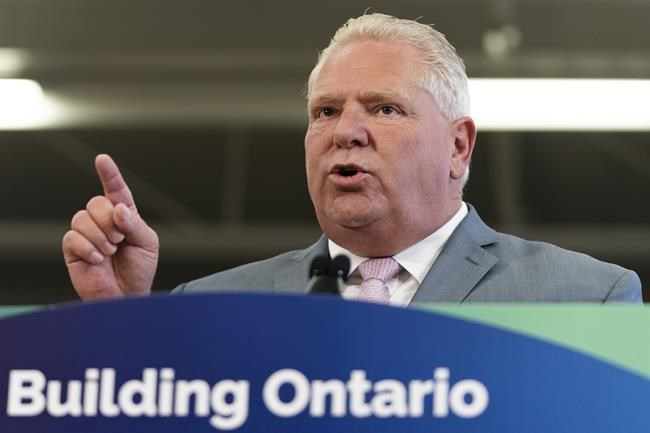TORONTO — Several Ontario municipalities have turned down the province's offer of strong mayor powers because of concerns either with housing targets the government has tied to them, or worries that the powers would lend themselves to a "dictatorship."
The Progressive Conservative government has assigned housing targets to 50 municipalities — their portion of the 1.5 million homes that Premier Doug Ford has promised to get built by 2031. Ontario is currently well behind the pace needed to accomplish that goal.
As long as the municipality formally commits to their target through a housing pledge, the province will grant them strong mayor powers, which include allowing the head of council to propose housing-related bylaws and pass them with the support of one-third of councillors, override council approval of certain bylaws, and prepare their city's budget, instead of council.
The province has framed the powers as a way to get more housing built quickly.
But some of the mayors with those powers have vowed not to use them, such as in Toronto and Ottawa, and several others received them with a lukewarm welcome, predicting they would only be used in extraordinary circumstances.
Now, four municipalities — Newmarket, New Tecumseth, Norfolk County and Haldimand County — have given a straight-up no thanks.
Newmarket was the first out of the gate, with Mayor John Taylor telling the province there was no way the town could build 12,000 homes in 10 years because the municipality doesn't currently have the sewage capacity to serve more than a couple thousand more homes.
"You can't commit to something that is literally impossible," he said in a recent interview.
The town is going back to the province to suggest an alternate target of 6,400 homes.
Ontario has announced that it is making $200 million over three years available to municipalities for water and wastewater projects. It is also giving up to $1.2 billion over three years through another fund for housing-related infrastructure — as long as municipalities meet at least 80 per cent of their housing targets.
But so far most municipalities aren't on track to qualify for their part of that $1.2-billion fund, under current rules. By the province's own figures, just 12 out of the 50 municipalities have achieved 80 per cent or more of their targets for 2023 housing starts, with less than two months left in the year. Many are not even at 40 per cent.
Housing starts are an unfair metric, municipalities say, since local governments can control the number of permits, but getting shovels in the ground is up to developers.
Norfolk County is another municipality that has now said no to strong mayor powers, in part because of those concerns over being measured by housing starts, with financing difficulties, labour shortages and supply chain issues stymying many builds, said Mayor Amy Martin.
"I think it is a manageable target for us if it's approvals, but ... in this global financial climate, the reality is (it's) so far out of the municipal hands," she said in an interview.
The Ontario Big City Mayors group has written to Municipal Affairs and Housing Minister Paul Calandra to ask him to allow municipalities to qualify for a piece of the fund based on how many building permits they issue, rather than on housing starts. Calandra's office said it would review the request.
Norfolk County council also decided that it just didn't want strong mayor powers to come to the community, Martin said.
"Norfolk County is not in a position to turn away an upper level of funding, we know that, yet council members really struggled with the strong mayor power attachment," she said.
"Not to make it about me, but there was lots of conversation around the table that, 'Maybe we work well with this mayor. It's not a concern now, but who's the next mayor?'"
Shelley Ann Bentley, mayor of Haldimand County, said her municipality was also worried about where strong mayor powers could lead.
"We don't think that having one person make the decisions of the whole municipality is fair," she said in an interview.
"We have council members. They each represent each ward. They represent the people that live in our community. They should be able to come to the table and represent the people in their ward and represent their issues, but if you have one person being able to dictate, it's more of a dictatorship than anything."
Strong mayors are also able to hire and fire department heads, and Bentley believes the provincial government could apply pressure to those municipalities to get rid of a chief administrative officer it believes is blocking its goals, for example, or hire a particular person.
"I think they want to eliminate our grassroots governments and we need to say no," Bentley said.
"We are growing and we have a housing target and we are going to probably meet the housing targets they're asking for, but let us do it on our own terms."
Municipalities also say the two new funding streams for housing-related infrastructure won't make up for a shortfall created by a provincial law that cuts some of the fees developers pay, which the communities use to fund those necessities. The Association of Municipalities of Ontario has pegged the deficit at about $5 billion.
A spokesperson for Calandra said the government encourages the four municipalities to commit to their housing targets.
"Should they do so, our government will give them the support they need to meet our shared housing goals, including strong mayor powers," Alexandru Cioban wrote in a statement.
This report by The Canadian Press was first published Nov. 10, 2023.
Allison Jones, The Canadian Press



